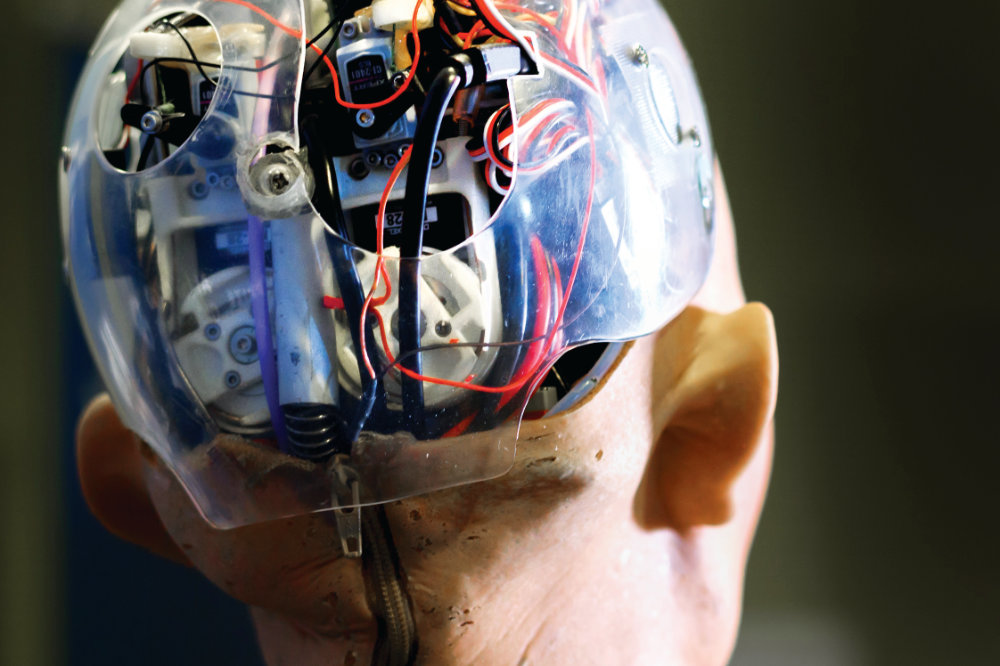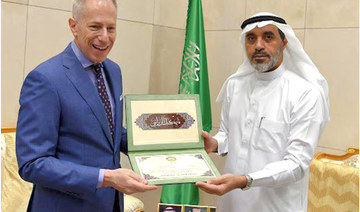DUBAI: Artificial intelligence, or AI, is touted as the most revolutionary innovation since the steam engine, heralding a new age in communications, healthcare and clean energy, but also new challenges for employment, widening inequalities and the rules around data privacy.
Saudi Arabia marked a milestone in the digital sphere this week with the launch of its new National Strategy for Data and Artificial Intelligence at the Global AI Summit (Oct. 21 & 22) in Riyadh, where the Kingdom also signed a raft of new agreements with tech firms.
With huge investments in infrastructure, education and contracts with world leaders in 5G, AI, and cloud storage, Saudi Arabia is marching to the front of the queue in what the World Economic Forum (WEF) has dubbed the Fourth Industrial Revolution (4IR).
“It is already transforming many aspects of how we relate to one another, how we do business, and it’s changing our medical system,” Fabrizio Hochschild, a special adviser to the UN secretary-general, told forum attendees on Wednesday.
“And it’s only going to grow in importance as we get more data points and more devices connected to the internet. AI will become the lifeblood of our economies and of our social and political lives.”
Among the flurry of new deals signed on day two of the Riyadh virtual summit were two strategic projects with Chinese tech giant Huawei, including one on Arabic language and character recognition. Although the Arabic language is spoken by almost 400 million people worldwide, observers say it is badly underserved when it comes to AI.
“This is very important because Saudi Arabia, as the leader in the Arab world, would like to support all Arab citizens with AI technologies specialized in the Arabic language,” said Dr. Majid Altuwaijri, general supervisor of the National Center for Artificial Intelligence at the Saudi Data and AI Authority (SDAIA).

With huge investments in infrastructure, education and contracts with world leaders in 5G, AI, and cloud storage, Saudi Arabia is marching to the front of the queue in the Fourth Industrial Revolution. (AFP)
“We are happy to be working together with Huawei to support the Arab world with technologies and tools that will make their lives easier.”
Charles Yang, president of Huawei, told the forum that innovations like 5G, AI and the cloud are fast becoming the platforms of the digital economy. As such, his firm is investing $100 billion in these technologies over the next five years.
And these investments are clearly paying off. Huawei’s financial performance in the first half of 2020 outstripped its own expectations, hitting $64.8bn — a 13 percent increase over last year.
“I strongly believe after our cooperation that we will support Saudi Arabia to achieve (its goals) and we will make AI, 5G and the cloud become a new driver and engine for the new Saudi economy,” Yang said.
An agreement signed with Alibaba Group, another Chinese firm, is designed to develop the Kingdom’s very own smart city project, leveraging advancements in several of China’s burgeoning cities.
A third deal was signed with US giant IBM to help transform the healthcare and energy sectors using the latest AI innovations. “We will also have our top people working closely with IBM researchers to come up with products that can help the world and humanity at large,” Altuwaijri said.
The Riyadh summit was about more than signing deals. Bringing together some of the brightest minds in future tech, participants explored what infrastructure nations will need in order to successfully deploy AI.
Speaking at the forum, Nasser Sulaiman Al-Nasser, group CEO of Saudi Telecom Company (STC), said countries should treat AI as part of an ecosystem, attract investments from both the public and private sectors, and draft the correct regulatory framework.
FASTFACTS
- $390.9 billion AI’s projected global market size by 2025.
- $20 billion AI investment KSA wants to attract.
- 20,000 AI experts KSA intends to train.
“There are pillars that need to be in place to ensure you position yourself as a digital transformation company,” Al-Nasser said. “You cannot assume an AI without the right technologies in place, meaning the cloud and 5G with its capabilities coupled with edge computing. It’s an infrastructure.”
To prepare for this revolution, Saudi Arabia has invested heavily in improving its internet speed, growing from 105th in the world three years ago to the top ten today.
One of the major fears around the 4IR is the impact of new technologies on employment. WEF predicts some 73 million jobs will be displaced by 2022. Action now could help populations adapt to whole new industries, said Al-Nasser.
“It’s expected that 130 million new jobs will be created, if there is the right conducive environment for education and training,” he said.
To this end, the Saudi government invested SR1 billion (roughly $266 million) in universities last year alone to help transform education. STC has become one of only a few companies in the Kingdom that has started hiring based on skills and not just education.
“We’ve seen talents in cybersecurity that have never gone to university and they are excellent,” Al-Nasser said. “We are making sure to pave the way for this — you cannot create opportunity unless you have a conducive environment for learning.”
Thanks to the Kingdom’s investment in its young population, Al-Nasser believes Saudi Arabia will lead the way in the development of AI.
Dr. Esam Alwagait, director of Saudi Arabia’s National Information Center, said 66 of the Kingdom’s Vision 2030 goals are directly linked to AI. But challenges persist, he says, as a regulatory system is yet to mature.
“You need to have a very agile regulatory system where it can adapt to avoid holding innovators and entrepreneurs back. But, at the same time, you don’t want to open up when you have issues like the trustworthy or the ethical AI,” he said.
Healthcare — a particularly delicate area in the realms of data privacy — is at the forefront of everybody’s mind right now, as COVID-19 challenges governments to find fast and reliable test and trace technologies to protect their populations.
Abdullah Alswaha, chairman of the G20 Digital Economy Ministerial Taskforce, said AI and other data crunching tech could quickly diagnose illnesses and improve health outcomes. That is why, this year’s G20 summit, under the Saudi presidency, will place the tech revolution front and center.
“We have a very unique opportunity with the convolution of connectivity, big data and AI to democratize healthcare in such a way that we could empower every citizen on the face of earth to have early healthcare checking systems,” Alswaha told the Riyadh virtual summit.
“These capabilities will help us tackle things like type 2 diabetes, which is one of the leading causes of blindness. And it's going to empower everybody to reach for their smartphone, take a photo of their retina and be able to have early detection of signs of type 2 diabetes.”
Similar technology can help Saudi Arabia transition to clean energy to safeguard the planet, Alswaha said, pointing to the Kingdom’s new Neom smart city on the Red Sea coast as the perfect place to explore these innovations.
“Neom is one of the top three destinations in terms of our ability to convert wind and solar into green electrons with an electrolysis process, with the Red Sea, to deliver green energy at such an affordable rate,” he said. “It will help us fast forward green aviation and green maritime transportation, because they cannot be powered by a lithium battery to date.”
_______________
• Twitter: @CalineMalek























